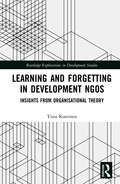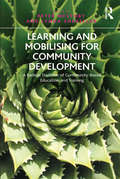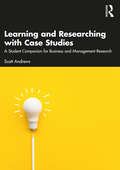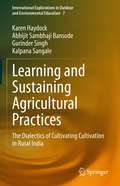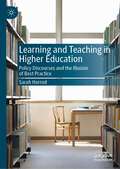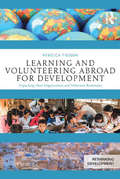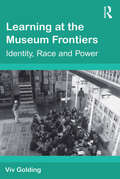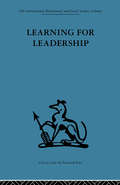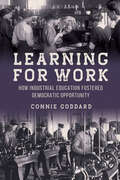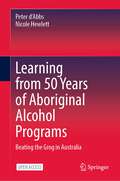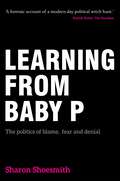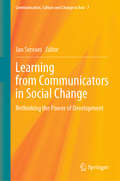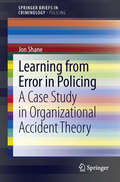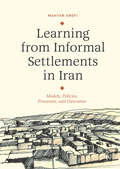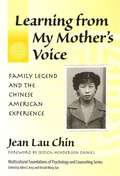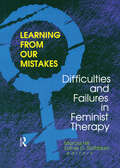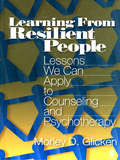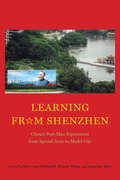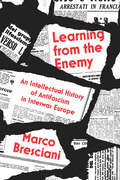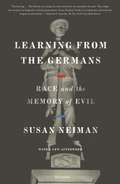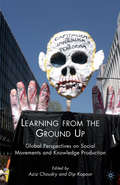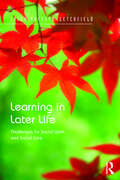- Table View
- List View
Learning and Forgetting in Development NGOs: Insights from Organisational Theory (Routledge Explorations in Development Studies)
by Tiina KontinenLearning and Forgetting in Development NGOs draws on a range of theoretical approaches and empirical evidence to explore how development organisations learn or fail to learn from experience. Despite the overwhelming discourses of NGOs as learning organisations, little is known about the phenomenon of learning within NGOs. As constantly changing buzzwords and institutional approaches abound and old ideas and concepts are "re-discovered", development NGOs are often accused of trying to reinvent the wheel as they struggle to escape from the challenges of development amnesia. Based on detailed empirical data on the everyday practices and accounts of development practitioners, this book moves between the boundaries of organisational institutionalism, learning theories, management and ethnographies of NGOs practices to investigate the many faces of organisational learning in an attempt to counteract development amnesia. Learning and Forgetting in Development NGOs will be an essential guide for students, scholars and development practitioners with an interest in development management and organisational theory.
Learning and Mobilising for Community Development: A Radical Tradition of Community-Based Education and Training
by Lynda ShevellarLearning and Mobilising for Community Development introduces the reader to different ways of thinking about, and organising community-based education and training within different settings. Stories from the global south and north illustrate approaches to collective learning and collective action. The book provides not only an insight into the how-to of community-based education and training, but through a range of applications, demonstrates the often unspoken shadow side of the developmental work we undertake. The first section of the book outlines the key elements that underpin effective community-based education and training. It then locates community-based education and training within a broader pedagogical project, by tracing the tradition of transformative learning and education. The second half of the book focuses on stories and practice, distilling the application of theory and frameworks. The practitioners within this book emerge from unique and challenging contexts. From civil resistance in West Papua and youth empowerment in South Africa to financial freedom in Australia, these diverse experiences speak to a common quest for social change and justice.
Learning and Researching with Case Studies: A Student Companion for Business and Management Research
by Scott AndrewsThis companion takes the student through the different approaches to working with cases in the classroom, virtually and for research purposes. Capturing insights and best practices shared by scholars of the case method from around the world, this book aims to: • equip students to work with and analyse case studies as part of their programme of study; • adapt student approaches to online learning with cases; • guide students on how to use case studies as a form of assessment; • help students looking to adopt a case study approach to a research project. These aims are framed in the sections of the book. Each section contains reflections from academics across the world, personal insights and lessons learnt from case sessions, templates, and exercises to develop your own skills in learning or researching with cases. Full examples showcase the nature of cases by type and format: short incident, exercise case, situation case; single, sequential and digital cases. This text is for undergraduate and postgraduate Business and Management students, those studying as part of executive education programmes, MBA students, and academics who are using or preparing to use case studies in their learning or research. Online resources include PowerPoint slides, video material and example case studies from around the world.
Learning and Researching with Case Studies: A Student Companion for Business and Management Research
by Scott AndrewsThis companion takes the student through the different approaches to working with cases in the classroom, virtually and for research purposes. Capturing insights and best practices shared by scholars of the case method from around the world, this book aims to:• equip students to work with and analyse case studies as part of their programme of study;• adapt student approaches to online learning with cases;• guide students on how to use case studies as a form of assessment;• help students looking to adopt a case study approach to a research project.These aims are framed in the sections of the book. Each section contains reflections from academics across the world, personal insights and lessons learnt from case sessions, templates, and exercises to develop your own skills in learning or researching with cases. Full examples showcase the nature of cases by type and format: short incident, exercise case, situation case; single, sequential and digital cases.This text is for undergraduate and postgraduate Business and Management students, those studying as part of executive education programmes, MBA students, and academics who are using or preparing to use case studies in their learning or research. Online resources include PowerPoint slides, video material and example case studies from around the world.
Learning and Sustaining Agricultural Practices: The Dialectics of Cultivating Cultivation in Rural India (International Explorations in Outdoor and Environmental Education #7)
by Gurinder Singh Karen Haydock Abhijit Sambhaji Bansode Kalpana SangaleThis book describes a participatory case study of a small family farm in Maharashtra, India. It is a dialectical study of cultivating cultivation: how paddy cultivation is learnt and taught, and why it is the way it is. The paddy cultivation that the family is doing at first appears to be ‘traditional’. But by observation and working along with the family, the authors have found that they are engaging in a dynamic process in which they are questioning, investigating, and learning by doing. The authors compare this to the process of doing science, and to the sort of learning that occurs in formal education. The book presents evidence that paddy cultivation has always been varying and evolving through chance and necessity, experimentation, and economic contingencies. Through the example of one farm, the book provides a critique of current attempts to sustain agriculture, and an understanding of the ongoing agricultural crisis.
Learning and Teaching Community-Based Research
by Catherine Etmanski Budd L. Hall Teresa DawsonCommunity-Based Research, or CBR, is a mix of innovative, participatory approaches that put the community at the heart of the research process. Learning and Teaching Community-Based Research shows that CBR can also operate as an innovative pedagogical practice, engaging community members, research experts, and students.This collection is an unmatched source of information on the theory and practice of using CBR in a variety of university- and community-based educational settings. Developed at and around the University of Victoria, and with numerous examples of Indigenous-led and Indigenous-focused approaches to CBR, Learning and Teaching Community Based-Research will be of interest to those involved in community outreach, experiential learning, and research in non-university settings, as well as all those interested in the study of teaching and learning.
Learning and Teaching in Higher Education: Policy Discourses and the Illusion of Best Practice
by Sarah HorrodThis book explores the discourses in learning and teaching policy in UK higher education, traces how these ideas are recontextualised at institutional level and reveals the differences between policy discourses and lecturers’ and students’ experiences. The author argues that policy ideas around learning and teaching are not simply value-free ‘best practice’ but reflect the socio-political context of higher education. The study uses an innovative conceptual framework of critical discourse studies (CDS) and Bernstein’s sociology of pedagogy to provide critical lenses to uncover the underlying messages of policy. The book will interest a wide academic audience including anyone involved in higher education globally.
Learning and Volunteering Abroad for Development: Unpacking Host Organization and Volunteer Rationales (Rethinking Development)
by Rebecca TiessenLearning/volunteer abroad programmes provide opportunities for cross-cultural understanding, partnership-building, and cooperative development, but there are also significant structural challenges and inequality of opportunity issues that result from these partnerships between host organizations in the Global South and learning/volunteer abroad for development (LVA4D) participants from the Global North. Learning and Volunteering Abroad for Development aims to unpack the complex benefits and disadvantages of learning/volunteer abroad programmes, using insights from the volunteers who travel abroad and the communities who host them. Based on empirical research within both volunteer and host communities, this book provides students and scholars with an alternative framework for a more careful and nuanced analysis of international volunteering programmes, highlighting ways to improve critical reflection, development outcomes, and intercultural competence. Supported by a website with additional learning resources, this book is an integral resource for senior undergraduate and graduate students interested in going abroad, as well as for scholars or development professionals who are leading or researching such programmes.
Learning at the Museum Frontiers: Identity, Race and Power
by Viv GoldingIn Learning at the Museum Frontiers, Viv Golding argues that the museum has the potential to function as a frontier - a zone where learning is created, new identities are forged and new connections made between disparate groups and their own histories. She draws on a range of theoretical perspectives including Gadamer's philosophical hermeneutics, Foucauldian discourse on space and power, and postcolonial and Black feminist theory, as well as her own professional experience in museum education over a ten-year period, applying these ideas to a wide range of museum contexts. The book offers an important theoretical and empirical contribution to the debate on the value of museums and what they can contribute to society. The author reveals the radical potential for museums to tackle injustice and social exclusion, challenge racism, enhance knowledge and promote truth.
Learning behind Bars: How IRA Prisoners Shaped the Peace Process in Ireland
by Deiter ReinischLearning behind Bars is an oral history of former Irish republican prisoners in the Republic of Ireland and Northern Ireland between 1971, the year internment was introduced, and 2000, when the high-security Long Kesh Detention Centre/HM Prison Maze closed. Dieter Reinisch outlines the role of politically motivated prisoners in ending armed conflicts as well as the personal and political development of these radical activists during their imprisonment. Based on extensive life-story interviews with Irish Republican Army (IRA) ex-prisoners, the book examines how political prisoners developed their intellectual positions through the interplay of political education and resistance. It sheds light on how prisoners used this experience to initiate the debates that eventually led to acceptance of the peace process in Northern Ireland. Politically relevant and instructive, Learning behind Bars illuminates the value of education, politics, and resistance in the harshest of social environments.
Learning for Leadership: Interpersonal and intergroup relations
by A K RiceTavistock Press was established as a co-operative venture between the Tavistock Institute and Routledge & Kegan Paul (RKP) in the 1950s to produce a series of major contributions across the social sciences. This volume is part of a 2001 reissue of a selection of those important works which have since gone out of print, or are difficult to locate. Published by Routledge, 112 volumes in total are being brought together under the name The International Behavioural and Social Sciences Library: Classics from the Tavistock Press.Reproduced here in facsimile, this volume was originally published in 1965 and is available individually. The collection is also available in a number of themed mini-sets of between 5 and 13 volumes, or as a complete collection.
Learning for Work: How Industrial Education Fostered Democratic Opportunity
by Connie GoddardFounded in 1883, the Chicago Manual Training School (CMTS) was a short-lived but influential institution dedicated to teaching a balanced combination of practical and academic skills. Connie Goddard uses the CMTS as a door into America’s early era of industrial education and the transformative idea of “learning to do.” Rooting her account in John Dewey’s ideas, Goddard moves from early nineteenth century supporters of the union of learning and labor to the interconnected histories of CMTS, New Jersey’s Manual Training and Industrial School for Colored Youth, North Dakota’s Normal and Industrial School, and related programs elsewhere. Goddard analyzes the work of movement figures like abolitionist Theodore Weld, educators Calvin Woodward and Booker T. Washington, social critic W.E.B. Du Bois, Dewey himself, and his influential Chicago colleague Ella Flagg Young. The book contrasts ideas about manual training held by advocate Nicholas Murray Butler with those of opponent William Torrey Harris and considers overlooked connections between industrial education and the Arts and Crafts Movement. An absorbing merger of history and storytelling, Learning for Work looks at the people who shaped industrial education while offering a provocative vision of realizing its potential today.
Learning from 50 Years of Aboriginal Alcohol Programs: Beating the Grog in Australia
by Peter d’Abbs Nicole HewlettThis open access book deals with community-based attempts on the part of Aboriginal communities and groups in Australia to address harms arising from alcohol misuse. Alcohol-related harms are viewed as both a product of colonisation and dispossession and a contributor to ongoing social, economic and health-related disadvantage, both in Australia and in other countries with colonised Indigenous populations, such as Canada, the US and New Zealand. This book contributes to an evidence-base by bringing together a selection of existing Australian documents considered by the editors to have continuing relevance to all those concerned with dealing with alcohol-related harms among Aboriginal peoples, These are contextualised in original chapters that recount key events, ideas, and programs. The book is a practical resource for all people and groups concerned with addressing Aboriginal and Torres Strait Islander alcohol-related harms, both at the community level and at the level of policy-making and administration.
Learning from Baby P: The politics of blame, fear and denial
by Sharon ShoesmithSharon Shoesmith was Director of Children's Services for Haringey in 2007 at the time of the death of Peter Connelly, also known as 'Baby P'. In Learning from Baby P, she carries out a dispassionate analysis of the events which followed Peter Connelly's death, documenting the responses of the media, politicians and the public. She explores the psychological and emotional responses we share when faced with such horrifying cases of familial child homicide, and how a climate of fear and blame which follows such tragedies can lead to negative consequences for other children at risk of harm, and for the social workers striving to protect them. Learning from Baby P is a thought-provoking book which aims to deepen understanding and shed light on the difficult relationship between politics, the media and child protection.
Learning from Communicators in Social Change: Rethinking the Power of Development (Communication, Culture and Change in Asia #7)
by Jan ServaesThis book presents the perspectives of some of the main players, both academics and professionals, in communication for sustainable development and social change so as to provide valuable lessons for future generations of change agents. It places emphasis on both the theoretical foundation and practical applications and ethical concerns in communication for development and social change. Most of the available historical accounts in development communications make a distinction between the modernization paradigm, the dependency paradigm and the multiplicity or participatory paradigm. These historical accounts have been dominated by framing developments within these paradigms, as the logical offspring of the Western drive to develop the world after colonization and the Second World War. The subsequent collapse of the Soviet Union in the late eighties, together with the rise of the U.S. as the only remaining ‘superpower,’ the emergence of the European Union and China, the gradual coming to the fore of regional powers, such as the BRICS countries, and the recent meltdown of the world financial system has rendered disastrous consequences for people everywhere. This book responds to these changes and challenges in presenting a rethinking of the “power” of development, and consequently the place and role of communication in it. It is aimed at both emerging research students, policymakers and social research practitioners who are interested in the history of communication for development and social change and the role and place of mayor players in it. This is most applicable to the political and educational sector, as well as scholars of history, social work, and human rights. The book will provide valuable insights for beginners in these fields who are not yet familiar with the increasingly important and emerging field of global social change.
Learning from Error in Policing
by Jon ShaneWhile the proximate cause of any accident is usually someone's immediate action-- or omission (failure to act)--there is often a trail of underlying latent conditions that facilitated their error: the person has, in effect, been unwittingly "set up" for failure by the organization. This Brief explores an accident in policing, as a framework for examining existing police practices. Learning from Error in Policing describes a case of wrongful arrest from the perspective of organizational accident theory, which suggests a single unsafe act--in this case a wrongful arrest--is facilitated by several underlying latent conditions that triggered the event and failed to stop the harm once in motion. The analysis demonstrates that the risk of errors committed by omission (failing to act) were significantly more likely to occur than errors committed by acts of commission. By examining this case, policy implications and directions for future research are discussed. The analysis of this case, and the underlying lessons learned from it will have important implications for researchers and practitioners in the policing field.
Learning from Informal Settlements in Iran: Models, Policies, Processes, and Outcomes
by Mahyar ArefiThis book explores the tenacity of Iran’s informal settlements against the backdrop of the World Bank’s USD 80 million loan for physical upgrading. Arefi seeks to identify and unravel the distinctive models, policies, processes, and outcomes associated with it, and explains why—despite obvious challenges—informal settlements remain popular in Iran, and also how understanding them in a broader theoretical context helps rectify existing redevelopment policies in order to develop more effective ones.
Learning from My Mother's Voice: Family Legend and the Chinese American Experience
by Jean Lau Chin"As the reader takes Jean Lau Chin's guided tours through myth and cultural history, it is clear that these stories are more than entertainment: They represent cultural messages about living as a woman. The juxtaposition of Chinese and Western myths with their similarities and differences, followed by the author's incisive analysis of contemporary stories depicting Asian women in print and on the screen, provide culturally driven connections to perceptions and behaviors of Chinese women both individually and in relation to the world. Through these stories, a rich tapestry of information about Chinese women and Chinese American women emerges. The stereotypical Chinese woman fails to appear as the various lenses of ethnicity, gender, location, and epoch make explicit the diversity that exists within any ethnic group and liberate us by providing an informed array of images and possibilities." From Book
Learning from Our Mistakes: Difficulties and Failures in Feminist Therapy
by Esther D Rothblum Marcia HillIf you’re a long-time veteran of feminist therapy or someone just starting out, you’ll find a helpful, reliable list of “dos” and “don’ts” in Learning from Our Mistakes: Difficulties and Failures in Feminist Therapy. Frank and honest in tone, makeup, and style, this one-of-a-kind publication looks at the failures and roadblocks that have hampered feminist therapists in the past so you can learn from their misfortunes and avoid them in your own professional endeavors. In Learning from Our Mistakes, you’ll come face-to-face with classic difficult cases, and you’ll see from a feminist perspective how therapists used various treatments to deal with these seemingly insurmountable challenges. You’ll find that these and other topics will help you in navigating the difficult situations that arise in your personal practice: the pros and cons of terminating with a client who has an eroticized transference differences between therapists and clients in terms of race, ethnicity, and age problems encountered by rural therapists in small communities using a translator in therapy when the therapist and client don’t speak the same language feelings of anger in therapy many other “log jams” in the therapeutic processIt’s no mistake that Learning from Our Mistakes is full of what works and what doesn’t. In it, three veteran discussants give you the tools necessary to overcome the uncertainties and inadequacies that plague therapists. You’ll come away understanding the many ways failure is embedded in both the theory and practice of psychotherapy. Ultimately, you’ll find that mistakes are really only failure narratives waiting to be used, shaped, and turned toward the positive experiences of both client and therapist.
Learning from Resilient People: Lessons We Can Apply to Counseling and Psychotherapy
by Morley D. GlickenThis comprehensive core textbook analyzes how resilient people navigate the troubled waters of life's traumas and identifies how learning about resilience may help cultivate this quality in other, less resilient, people. Author Morley D. Glicken explains the inner self-healing processes of resilient people and helps individuals training in the helping professions to learn to use these processes in working with their clients.
Learning from Shenzhen: China’s Post-Mao Experiment from Special Zone to Model City
by Jonathan Bach Mary Ann O'Donnell Winnie WongThis multidisciplinary volume, the first of its kind, presents an account of China’s contemporary transformation via one of its most important yet overlooked cities: Shenzhen, located just north of Hong Kong. In recent decades, Shenzhen has transformed from an experimental site for economic reform into a dominant city at the crossroads of the global economy. The first of China’s special economic zones, Shenzhen is today a UNESCO City of Design and the hub of China’s emerging technology industries. Bringing China studies into dialogue with urban studies, the contributors explore how the post-Mao Chinese appropriation of capitalist logic led to a dramatic remodeling of the Chinese city and collective life in China today. These essays show how urban villages and informal institutions enabled social transformation through cases of public health, labor, architecture, gender, politics, education, and more. Offering scholars and general readers alike an unprecedented look at one of the world’s most dynamic metropolises, this collective history uses the urban case study to explore critical problems and possibilities relevant for modern-day China and beyond.
Learning from the Enemy: An Intellectual History of Antifascism in Interwar Europe
by Marco BrescianiThe first comprehensive history of an Italian revolutionary group that fought fascism in interwar Europe and pursued a liberal socialist project beyond itThis Italian antifascist revolutionary group "Giustizia e Libertà" operated both in emigration and as part of the clandestine resistance, offering radical responses to the rise of Fascism, Nazism and Stalinism. How to understand and fight fascism? How to rethink politics in the maelstrom of crisis that shook Italian and European society in the 1930s? How to design a new post-fascist order out of the ruins of the Great War?To answer these questions "Giustizia e Libertà," founded by Carlo Rosselli in Paris in 1929 and disbanded in 1940, developed several revolutionary projects and linked socialist and liberal traditions in innovative ways, inspired by French and European culture.Their debates focused on fascism as a product of a post-1914 civilizational crisis and a key political, social, cultural phenomenon of the interwar period. To struggle against its enemy, the group aimed to go beyond the Marxist notion of class and to assert different concepts of nation and Europe, while elaborating lucid comparative thoughts on tyrannies.
Learning from the Germans: Race and the Memory of Evil
by Susan NeimanAs an increasingly polarized America fights over the legacy of racism, Susan Neiman, author of the contemporary philosophical classic Evil in Modern Thought, asks what we can learn from the Germans about confronting the evils of the pastIn the wake of white nationalist attacks, the ongoing debate over reparations, and the controversy surrounding Confederate monuments and the contested memories they evoke, Susan Neiman’s Learning from the Germans delivers an urgently needed perspective on how a country can come to terms with its historical wrongdoings. Neiman is a white woman who came of age in the civil rights–era South and a Jewish woman who has spent much of her adult life in Berlin. Working from this unique perspective, she combines philosophical reflection, personal stories, and interviews with both Americans and Germans who are grappling with the evils of their own national histories.Through discussions with Germans, including Jan Philipp Reemtsma, who created the breakthrough Crimes of the Wehrmacht exhibit, and Friedrich Schorlemmer, the East German dissident preacher, Neiman tells the story of the long and difficult path Germans faced in their effort to atone for the crimes of the Holocaust. In the United States, she interviews James Meredith about his battle for equality in Mississippi and Bryan Stevenson about his monument to the victims of lynching, as well as lesser-known social justice activists in the South, to provide a compelling picture of the work contemporary Americans are doing to confront our violent history. In clear and gripping prose, Neiman urges us to consider the nuanced forms that evil can assume, so that we can recognize and avoid them in the future.
Learning from the Ground Up
by Aziz Choudry Dip KapoorThe dynamics, politics, and richness of knowledge production in social movements and social activist contexts are often overlooked. This book contends that some of the most radical critiques and understandings about dominant ideologies and power structures, and visions of social change, have emerged from those spaces.
Learning in Later Life: Challenges for Social Work and Social Care
by Trish Hafford-LetchfieldWithin the UK and Europe, government legislation and policies concerned with demography have asserted a paradigmatic shift towards the increased engagement of older people with public services. The philosophy of user involvement and co-production within these contexts has become integral to finding ways in which to improve the wellbeing of older people and their experiences of ageing well. Whilst this area has been steadily emerging within the educational field in relation to the lifelong learning of older people, there has been a relative under-theorization and a lack of empirical research however into the lifelong learning needs, opportunities and experiences of those older people using social care who are typically marginalized from these debates and developments. This book address this gap by paying specific attention to examining what opportunities might be present within care services and public services in general for older people using social care to capitalize on the skills and knowledge they might need to achieve more person-centred support. Through developing a debate and argument for the convergence of the lifelong learning agenda with social policy and social care, its core argument focusses on the challenge of sustainability of the care and support of older people. The author explores how social care could engage more meaningfully with concepts such as social capital and the challenges associated with achieving a genuine co-productive approach towards the quality of experience of older people using social care. This book will be an essential read for professionals working with older people in health and social care, as well as those engaged with gerontology and ageing studies in education and practice.
